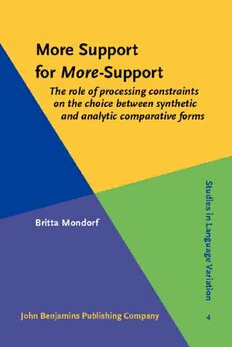Table Of ContentMore Support for More-Support
Studies in Language Variation
The series aims to include empirical studies of linguistic variation as well as its description,
explanation and interpretation in structural, social and cognitive terms. The series will
cover any relevant subdiscipline: sociolinguistics, contact linguistics, dialectology, historical
linguistics, anthropology/anthropological linguistics. The emphasis will be on linguistic
aspects and on the interaction between linguistic and extralinguistic aspects — not on
extralinguistic aspects (including language ideology, policy etc.) as such.
Editors
Peter Auer Frans Hinskens Paul Kerswill
Universität Freiburg Meertens Instituut & Lancaster University
Vrije Universiteit, Amsterdam
Editorial Board
Jannis K. Androutsopoulos Barbara Horvath Rajend Mesthrie
King’s College, London University of Sydney University of Cape Town
Arto Anttila Brian Joseph Pieter Muysken
Stanford University The Ohio State University Radboud University Nijmegen
Gaetano Berruto Johannes Kabatek Marc van Oostendorp
L’Università di Torino Eberhard Karls Universität Tübingen Meertens Institute & Leiden
Paul Boersma Juhani Klemola University
University of Amsterdam University of Tampere Sali Tagliamonte
Jenny Cheshire Miklós Kontra University of Toronto
University of London University of Szeged & Hungarian Johan Taeldeman
Academy of Sciences University of Gent
Gerard Docherty
Newcastle University Bernard Laks Øystein Vangsnes
CNRS-Université Paris X Nanterre University of Tromsø
Penny Eckert
Stanford University Maria-Rosa Lloret Juan Villena Ponsoda
Universitat de Barcelona Universidad de Málaga
William Foley
University of Sydney K. K. Luke
The University of Hong Kong
Volume 4
More Support for More-Support. The role of processing constraints on the choice
between synthetic and analytic comparative forms
by Britta Mondorf
More Support for More-Support
The role of processing constraints on the choice
between synthetic and analytic comparative forms
Britta Mondorf
Johannes Gutenberg-Universität, Mainz
John Benjamins Publishing Company
Amsterdam / Philadelphia
TM The paper used in this publication meets the minimum requirements of
8
American National Standard for Information Sciences – Permanence of
Paper for Printed Library Materials, ansi z39.48-1984.
Library of Congress Cataloging-in-Publication Data
Mondorf, Britta, 1963-
More support for more-support : the role of processing constraints on the choice
between synthetic and analytic comparative forms / Britta Mondorf.
p. cm. (Studies in Language Variation, issn 1872-9592 ; v. 4)
Includes bibliographical references and index.
1. English language--Comparison. 2. English language--Adjective. 3. Comparison
(Grammar) I. Title.
PE1241.M66 2009
425'.5--dc22 2009014291
isbn 978 90 272 3484 1 (hb; alk. paper)
isbn 978 90 272 8927 8 (eb)
© 2009 – John Benjamins B.V.
No part of this book may be reproduced in any form, by print, photoprint, microfilm, or any
other means, without written permission from the publisher.
John Benjamins Publishing Co. · P.O. Box 36224 · 1020 me Amsterdam · The Netherlands
John Benjamins North America · P.O. Box 27519 · Philadelphia pa 19118-0519 · usa
To Günther Rohdenburg
on the occasion of his 65th birthday,
with gratitude
Table of contents
chapter 1
Introduction� 1
1.1 The state of the art�2
1.2 Structure of the book�2
chapter 2
Theoretical preliminaries� 5
2.1 More-support�6
2.2 The problem of defining complexity�8
chapter 3
Methodological preliminaries� 11
chapter 4
More-support in phonology� 17
4.1 Avoidance of identity effects I: Stress clash avoidance� 17
4.1.1 The Principle of Rhythmic Alternation� 17
4.1.2 Deriving the hypothesis� 18
4.1.3 Monosyllabic adjectives� 18
4.1.4 Disyllabic adjectives� 19
4.2 Avoidance of identity effects II: Identical
morpho-phonological segments� 24
4.3 Avoidance of identity effects III: Consonant clusters� 30
4.4 Final segments� 33
chapter 5
More-support in morphology� 35
chapter 6
More-support in the lexicon� 37
6.1 Length� 37
6.2 Frequency� 40
6.3 Compounds� 42
�More support for more-support
6.3.1 The cognitive complexity of compounds� 44
6.3.2 Do compound adjectives take synthetic comparison?� 45
6.3.3 Degree of lexicalisation� 49
6.3.4 Theoretical implications� 51
6.3.5 Summary and discussion� 54
6.4 Parallel structures� 56
chapter 7
More-support in syntax� 57
7.1 Argument complexity� 57
7.1.1 Methodology� 60
7.1.2 Distinguishing between obligatory complements,
optional complements and adjuncts� 60
7.1.3 Eliminating attributive uses� 63
7.1.4 Infinitival complements� 63
7.1.4.1 Eliminating prepositional complement
effects and the end-weight factor� 64
7.1.4.2 The effect of infinitival complements� 64
7.1.4.3 Psycholinguistic evidence for more-support
with infinitival complements� 68
7.1.4.4 Tough movement� 70
7.1.5 Prepositional complements� 72
7.1.6 Quantifying each determinant’s contribution� 75
7.1.7 Than-phrases: A telling ‘counterexample’� 78
7.2 Position� 80
7.2.1 Positional distribution of different formal
types of adjectives� 80
7.2.2 Positional distribution of the individual adjectives investigated� 84
7.2.3 Contrasting different formal types of adjectives
according to position� 87
7.2.4 Towards an explanation of the positional preferences� 88
chapter 8
More-support in semantics� 91
8.1 Concrete vs. abstract� 91
8.1.1 Psycholinguistic evidence on concreteness effects
in language processing� 91
8.1.2 Corpus study on more-support with abstract meanings� 93
8.2 Literal vs. figurative meanings� 96
8.3 Weak gradability� 97
Table of contents
chapter 9
More-support in pragmatics/iconicity� 99
9.1 End-weight� 99
9.1.1 Methodology� 100
9.1.2 The end-weight effect in comparative alternation� 102
9.1.3 The end-weight effect for the individual
adjectives investigated� 103
9.1.4 Discussion� 106
9.2 Proximity� 107
9.3 Cumulative comparatives� 109
9.4 Gradual increase� 110
9.5 Emphasis or ‘Is more proud prouder than prouder?’� 112
9.6 Establishment in discourse� 114
9.7 Syntactic persistence� 115
chapter 10
The emergence of more-support in diachrony� 117
10.1 Previous research� 117
10.2 The debated origin of analytic forms of comparison� 120
10.3 Methodology� 122
10.4 Reversal of the typological shift from synthetic to analytic?� 126
10.5 Positional distribution from Early Modern English
to Present-Day English� 131
10.5.1 Positional distribution from Early Modern
to Present-Day British English� 132
10.5.2 Positional distribution in British and American English
in the Late Modern period� 133
10.5.3 Summary� 135
10.6 The emergent division of labour I: More-support with
Complex adjectives� 135
10.6.1 Introduction� 135
10.6.2 Complexity parameters� 136
10.6.3 Adjectives in -ful� 137
10.6.4 Adjectives in -ing� 138
10.6.5 Adjectives in -y� 140
10.6.6 Adjectives in -ure� 142
10.6.7 Adjectives in -ere� 144
10.6.8 Adjectives in -some� 145
10.6.9 Adjectives in -al� 146
10.6.10 Monosyllabic adjectives� 148

